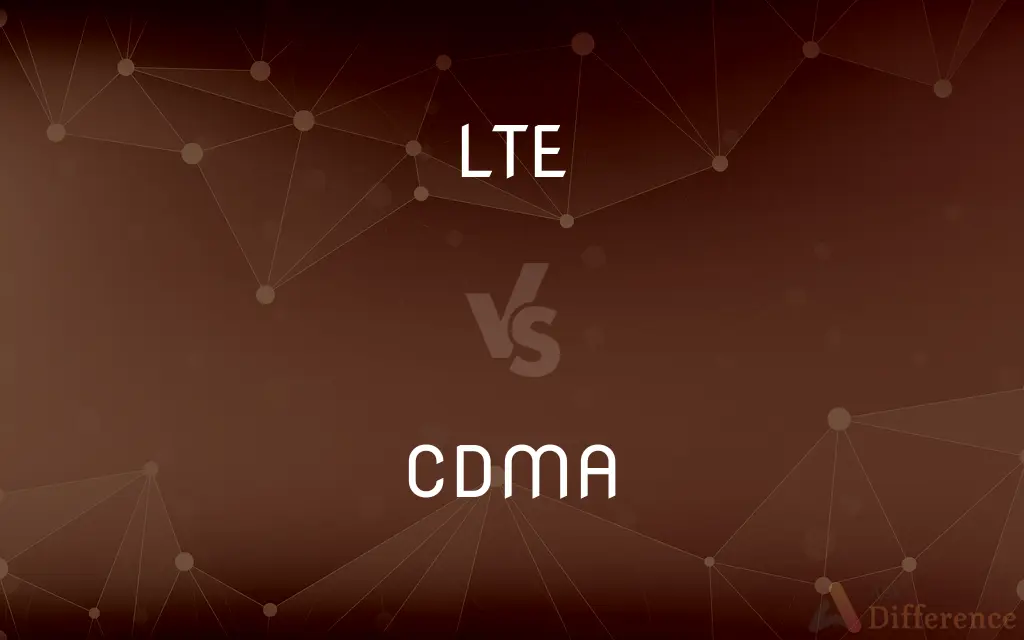LTE vs. CDMA — What's the Difference?
By Tayyaba Rehman — Published on January 23, 2024
LTE (Long-Term Evolution) is a standard for high-speed wireless communication, while CDMA (Code Division Multiple Access) is an older digital cellular technology focusing on channel access method.

Difference Between LTE and CDMA
Table of Contents
ADVERTISEMENT
Key Differences
LTE (Long-Term Evolution) is a standard for wireless broadband communication, primarily known for its high data transmission speeds and improved network capacity. It represents the 4G wireless technology. In contrast, CDMA (Code Division Multiple Access) is an older form of cellular technology used primarily for 2G and 3G networks, focusing on a channel access method that allows multiple signals to occupy a single transmission channel, optimizing the use of available bandwidth.
LTE supports higher data rates, offering faster internet speeds and more efficient data transmission. This makes it suitable for modern applications like streaming and online gaming. On the other hand, CDMA provides lower data rates and is less capable of handling today’s high-data applications.
In terms of global reach, LTE has a wider adoption, as it is the standard for 4G networks worldwide. CDMA, while used globally, is more limited in comparison and has been phased out or replaced by LTE in many regions.
Device compatibility is another key difference. LTE networks require SIM cards for device connectivity. CDMA networks, however, do not typically use SIM cards and instead tie the device to the network through internal settings.
The evolution and future-proofing aspect also differ. LTE is part of the evolutionary path towards 5G and is designed to be scalable and future-proof. CDMA, being an older technology, does not have a direct evolutionary path to newer generations of network technologies.
ADVERTISEMENT
Comparison Chart
Network Generation
4G (evolving to 5G)
2G and 3G
Data Transmission Speed
Higher, suitable for modern applications
Lower, less suitable for high-data apps
Global Adoption
Widespread and growing
Limited, being phased out
Device Compatibility
Requires SIM cards
Does not use SIM cards
Future Evolution
Part of the path to 5G
No direct path to newer generations
Compare with Definitions
LTE
High-speed wireless communication standard.
My phone uses LTE for fast internet browsing.
CDMA
Used in 2G and 3G networks.
CDMA was prominent in the early days of mobile communication.
LTE
Offers efficient data transmission.
LTE networks handle data transmission more efficiently than older networks.
CDMA
Does not typically use SIM cards.
CDMA phones are directly programmed by the carrier.
LTE
Known for improved data speeds.
Streaming HD videos is smooth on LTE networks.
CDMA
A channel access method for cellular networks.
My old phone used CDMA technology.
LTE
Requires a SIM card for connectivity.
I got a new SIM card to access LTE services.
CDMA
Provides lower data rates.
CDMA networks are slower compared to LTE.
LTE
4G technology, evolving towards 5G.
LTE is a significant step up from 3G technology.
CDMA
Being phased out in favor of LTE.
Many operators are transitioning from CDMA to LTE.
Common Curiosities
What does CDMA stand for?
CDMA stands for Code Division Multiple Access, a channel access method used in cellular networks.
Are LTE networks more widespread than CDMA?
Yes, LTE networks have a broader global adoption compared to CDMA networks.
Can LTE be used for voice calls?
Yes, LTE can be used for voice calls, often through technologies like VoLTE (Voice over LTE).
Do all new smartphones support LTE?
Most modern smartphones are designed to support LTE networks.
Is CDMA still used anywhere?
While its use is declining, CDMA is still operational in some regions but is gradually being replaced by LTE.
What is LTE?
LTE stands for Long-Term Evolution, a high-speed wireless communication standard for mobile phones and data terminals.
Is LTE faster than CDMA?
Yes, LTE offers significantly higher data speeds compared to CDMA.
Do I need a new SIM card for LTE?
Yes, accessing LTE networks typically requires a SIM card compatible with LTE.
Why is CDMA being phased out?
CDMA is being phased out due to its lower data capabilities and the global shift towards more advanced LTE technology.
How does LTE improve internet browsing?
LTE enhances internet browsing with faster loading times, smoother streaming, and quicker downloads.
Can I use a CDMA phone on an LTE network?
CDMA phones are not compatible with LTE networks unless they are dual-mode devices that support both standards.
Will my CDMA phone work on a 4G network?
If your CDMA phone does not support LTE, it will not work on a 4G network.
What are the advantages of LTE over CDMA?
LTE offers faster data speeds, better network efficiency, wider global reach, and is future-proof, aligning with the evolution towards 5G.
Was CDMA ever the dominant technology?
CDMA was dominant in certain regions, especially in the early stages of cellular technology development.
Are LTE networks 5G compatible?
LTE networks are part of the evolutionary path towards 5G, with many carriers using existing LTE infrastructure as the foundation for 5G networks.
Share Your Discovery

Previous Comparison
Embassy Suites vs. Hampton Inn
Next Comparison
Diabetes Insipidus vs. SIADHAuthor Spotlight
Written by
Tayyaba RehmanTayyaba Rehman is a distinguished writer, currently serving as a primary contributor to askdifference.com. As a researcher in semantics and etymology, Tayyaba's passion for the complexity of languages and their distinctions has found a perfect home on the platform. Tayyaba delves into the intricacies of language, distinguishing between commonly confused words and phrases, thereby providing clarity for readers worldwide.














































